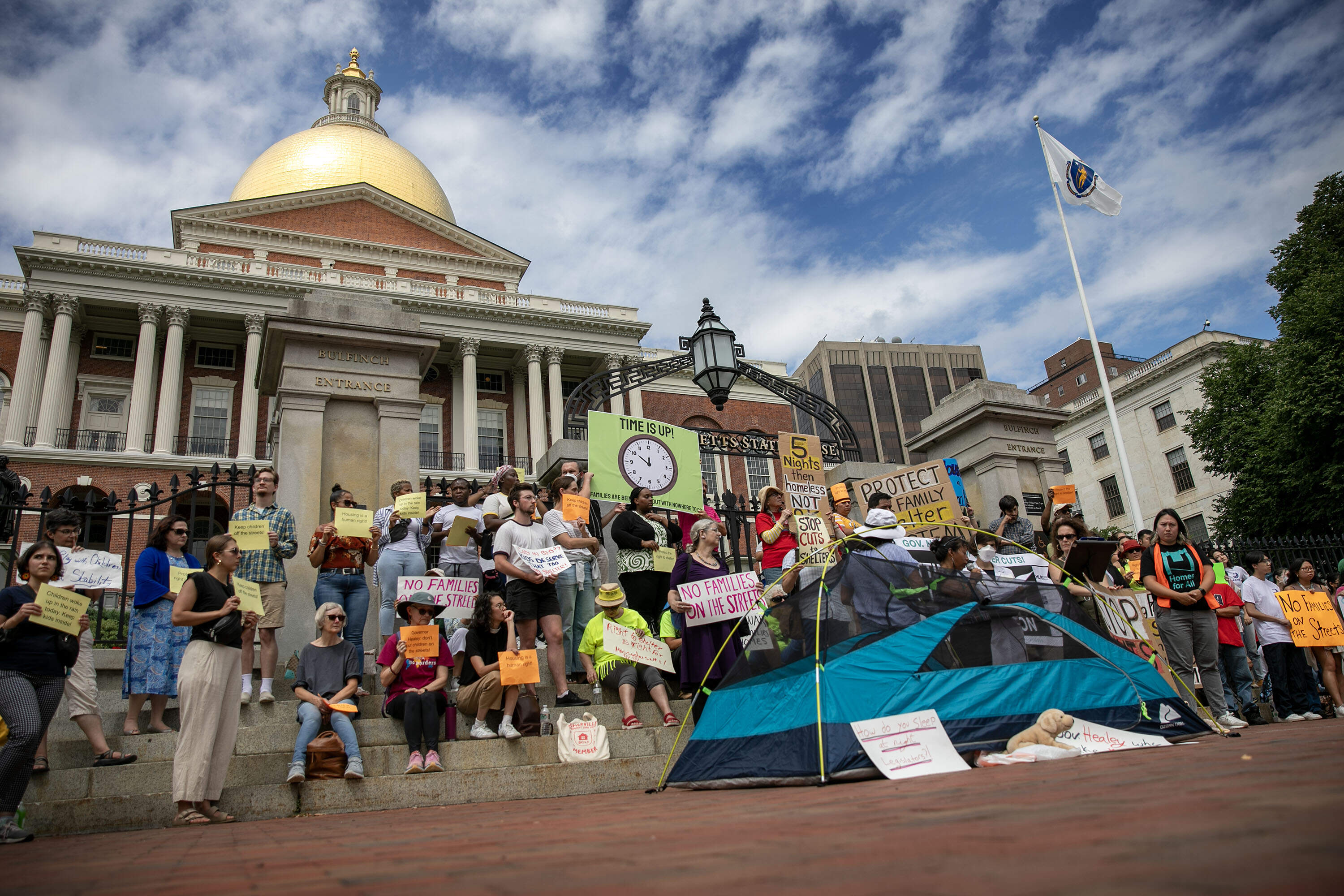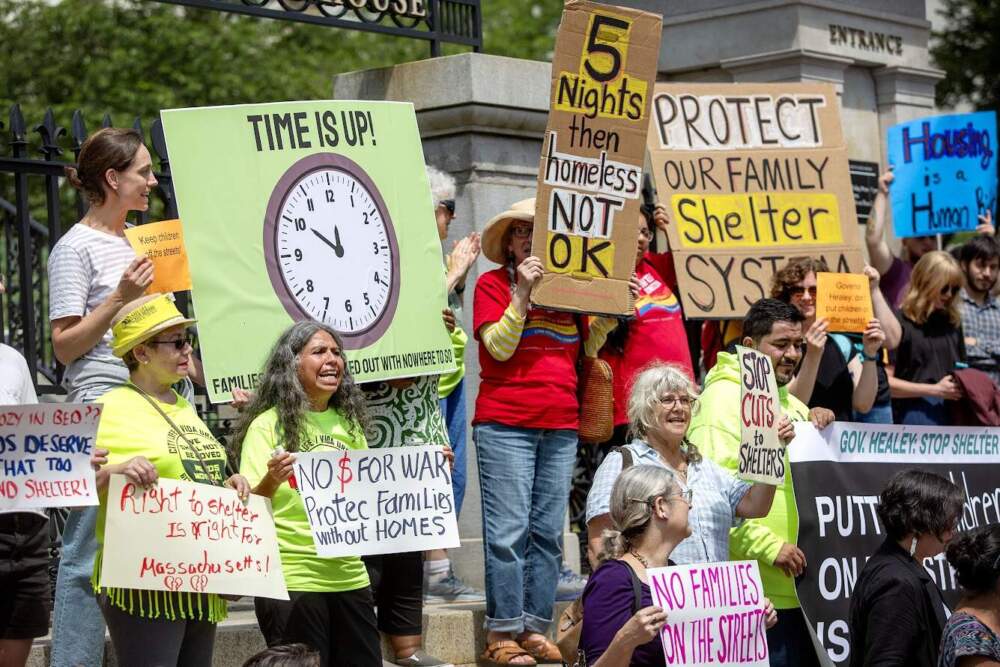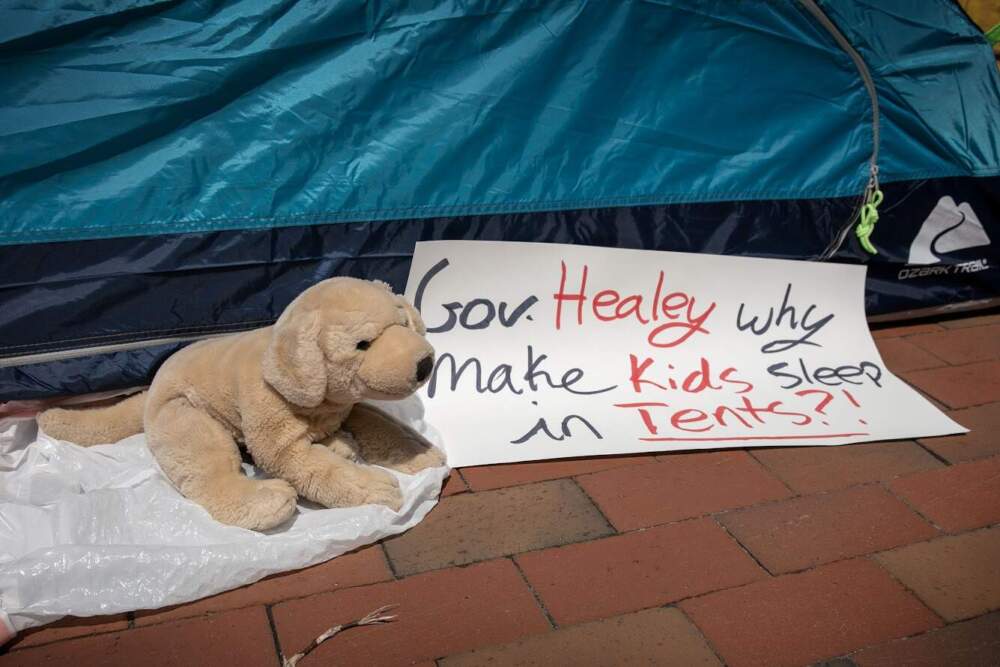Advertisement
Activists mobilize to find migrants shelter as state restrictions begin
Resume
At 5:30 p.m. on Wednesday, two dozen Haitians waited outside the Wollaston Red Line station in Quincy. The families were dropped off there by a pair of transport vans. Their children ran along the sidewalk, playing with dolls and wind-up toys, while parents stood stone-faced, worried about where they'd all sleep that night.
A translator explained how the migrants were sent here from a local "welcome center" run by the state: “They don't know. They just told them to come here, take the train to the next stop.”
“Wow,” activist Judy Wolberg said. “That’s bad.”
Wolberg was prepared to guide the immigrants to a nearby church that had agreed to put up tents for them in its garden. But now there was a problem.
“It's too many people,” Wolberg said. “We have only three empty tents that can hold four people each.”
After hearing through word of mouth that they’ll be welcome in Massachusetts, migrants continue to arrive. But things are getting much harder here for them, as the state imposes stricter limits on its family shelter system. Starting this week, families can only stay in overflow shelters for five days.
Now grassroots volunteers like Wolberg are scrambling to take up the slack. A retired midwife, Wolberg spends her days glued to her phone. She’s part of several WhatsApp groups, each with dozens of volunteers trying to put out fires wherever they arise.
One focal point is this Quincy T stop, where for the last several weeks, groups of Haitians have been camping. The station sits down the road from one of the welcome centers, where migrants can spend the day, but must fend for themselves in the evenings.
On Wednesday night, Wolberg thought out loud about how to triage the situation: “Do they want to send the children [to the church] with a couple of parents? ... How many men are there? Could they leave the men here?”
After a back-and-forth with the church's pastor, it was decided the whole group could stay at the church after all. Wolberg phoned two fellow activists, who showed up with cars in a matter of minutes to carry the Haitians and their bags to the church.
On a church lawn, problem solving and gratitude
The migrants walked through the church gates into a little green oasis: an impeccably manicured area where the congregation normally holds its outdoor services. Six tents stood before a massive granite cross and altar. The families negotiated easily among themselves who would sleep in which tent.
Another tent was needed — and a volunteer delivered one from Dorchester. Another volunteer drove to a store to fetch water, apple juice, crackers, diapers and wipes.

The migrants appeared relieved to have a place to stay for the night. Speaking through an interpreter, 29-year-old Nathalie Fortunise said she came to Massachusetts on Tuesday with her husband and two kids.
“They have no connection, no family here in Boston, but they heard from other people that they could get help from organizations, so they took a chance,” the interpreter said.
Fortunise traveled with her family from Chile, thousands of miles away, and she wants to settle in Massachusetts long term. Looking at the spread of tents on the church lawn, she said she felt blessed to have arrived at this kind of spot.
"She feels very happy to find a place like this," the interpreter said. "It's very welcoming. And she said, 'May God bless you for that,' " referring to the people providing help.
(The activists asked WBUR not to disclose the location of the church for two reasons: they don’t want to attract protesters, and to avoid having droves of people show up in search of shelter. For this reason WBUR is identifying the pastor by only her first name, Niki.)
Advertisement
Asked if there was any pushback from the congregation when she decided to open up the church to migrants, Pastor Niki said not yet.
“I'm sure there will be pushback from some folks, or at least concern,” she said. “And at the same time this community is only here because of immigrants. It’s ingrained into our story and who we are, and we can't forget that.”
Challenges are deepening for migrants, advocates say
Advocates are protesting the new shelter limits, saying it's impossible, and even cruel, to expect a family new to the country to have housing set up within five days. The Healey administration has defended its actions, saying the shelters are full and the state cannot afford to take on more migrant families.

As of Thursday, state officials said there were 7,396 families in the family shelter system and 271 families in what the state are now calling "Temporary Respite Centers." Across the four temporary sites, 57 families had been notified they'd have to leave by Friday, the state said. Shelters do have the ability to offer extensions.
Still, the new five-day limit complicates matters; staying at a respite center makes families ineligible for a family shelter for six months.
Small-scale efforts to help migrants are happening all over the Boston area, whether it's churches sharing space, activists opening up rooms in their homes, or Haitians already here lending a hand to compatriots who arrive with nothing.
But advocates say more help is needed if all the migrants arriving are going to stay off the streets.

Wolberg said with the new overflow shelter deadline in place, a crack in the shelter system is expanding into a chasm.
"Before, maybe it was a crack, and 50 host families could manage to help," she said. "Or if we paid for enough hotel rooms, just for the coldest weekend of the winter or the hottest of the summer — that helped.”
Now, Wolberg said, some families’ only option is to stay in tents. It's a temporary fix that won't help in bad weather and leaves families without a secure place to live and care for children.
Despite being steeped in similar work since she retired six years ago, she still finds it hard to believe it’s come down to people staying in tents.
“How can that be?” she said. “How can Massachusetts be a state that happens in?”
